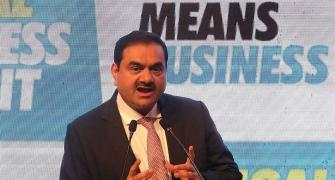In her speech at the inaugural meeting of the American Association of Physicians of Indian Origin and the Asian-American Hotel Owners Association in Washington, DC, on Monday, American Secretary of State Condoleezza Rice paid glowing tribute to Indian Americans and hailed the India-US nuclear deal as a landmark achievement.
Here's what she said:
'It's a delight to join with you to talk about President Bush's vision for the US-India relationship. I want to tell you that we consider strengthening and expanding and deepening the US-India relationship to be one of the President's signature foreign policy initiatives.
As all of you can attest, there is a new spirit of partnership between India and the United States and that spirit of partnership arises, first and foremost, from our people, from deep ties and shared aspirations that bind our democratic societies.
Two million people of Indian descent live in the United States today. They're decent and industrious people like you, who staff hotels and hospitals and own and operate hotels. I can tell you that they contribute to the intellectual capital of universities. I've dealt with many of those people in my time as an academic at Stanford. These are people who are debating the great issues of our time and adding, not only to the wealth of our nation, but also to the character of our country.
They're nurturing dreams for a better life and they're working hard and they're playing by the rules and they're sharing their successes with people who are less fortunate than themselves. And in doing so, Indian Americans are making America more American.
I know that many of you first came to the United States perhaps as students. And to the great benefit of this society, you chose to remain here in America: to live and to work and to raise your families. As a college professor, I'm deeply committed to ensuring that America remains open and welcoming as a country, even as we secure our borders. In fact, you should know that more Indians are studying in the United States right now than at any other time in our history -- 80,000 this year alone.
And of course our partnership of peoples runs both ways, because there are thousands of Americans who are living in India -- in cities like Delhi and Mumbai and in Bangalore. They are taking part in India's rich culture. They are becoming active members of Indian society. And they're doing their part to build a partnership that touches fields as diverse as agriculture and health and commerce and defence and science and technology and education.
The relations between our people point a way forward for cooperation between our governments. India, the world's largest democracy, is a natural partner for the United States, the world's oldest democracy.
India's society -- and I've experienced this personally -- is open and free and transparent and stable and multi-ethnic and multi-religious. India is a democracy that is characterised by individual freedom, by the rule of law, by civilian control of the military and by lively politics.
India will soon become the world's most populous nation, as well as one of the world's five largest economies. And of course, as a rising global power, India can be a pillar of stability in a rapidly changing Asia and a strategic partner for the United States as we meet the challenges of the 21st century.
America and India share so much in common, but during the past half century, our two nations have not lived up to the promise. This is something that President Bush set out to change from the very beginning. I can tell you that seven years ago, when I first became his foreign policy advisor and we began to talk about what he might do if he became President -- that was back when his first name was still governor.
We said that if he was elected he wanted one of his administration's top priorities to be to transform the relationship with India. And that's exactly what he's done. We've invested the necessary capital to build a global partnership with India -- a partnership founded on strategic success and strategic interests, common democratic ideals, a partnership that will advance the cause of peace and freedom and opportunity in this new century.
As President Bush said during his landmark visit to India in March: 'The United States and India are now closer than ever, and the partnership between our free nations has the power to transform the world.'
A key to unlocking the full promise of this partnership is the Civil Nuclear Cooperation Initiative that President Bush and Prime Minister (Dr Manmohan) Singh put forward in July. Consider where the United States and India were before we launched this initiative: We had a difficult relationship in many ways. We had failed non-proliferation policies and we had the wrong incentives on energy security and environmental protection.
The main obstacle to enhanced cooperation, of course, was India's unique nuclear record -- the fact that it had developed nuclear weapons, yet had never signed the Non-proliferation Treaty but it had never proliferated its nuclear technology.
By addressing India's unique situation, creatively and responsibly, our civil-nuclear initiative will elevate our partnership to a new strategic level. That's the first benefit, and as I see it, there are four more.
The initiative will enhance energy security. India is a nation of over one billion people, with an economy growing at approximately 8 per cent per year. This country is now the world's sixth largest energy consumer and its massive appetite for energy is of course growing. Diversifying India's energy sector will help it to meet the ever increasing needs of its people and, just as importantly, ease its reliance on hydrocarbons from unstable sources like Iran. This is good for India and it's good for the United States. Third, this initiative will benefit the environment. As I said, India's carbon emissions are growing rapidly as it works to meet its development needs, mostly through fossil fuels. A better alternative for the world that we share would be one to help India develop clean, environmentally free nuclear energy and that is exactly what this initiative will do.
Fourth, this initiative will create opportunities for American jobs. Civil nuclear cooperation with India will open a new market for American entrepreneurs and workers, which would create thousands of new jobs, directly and indirectly, within the United States.
By helping India's economy grow, we would thus be helping our own. Finally, this initiative will add to the stability and security of our world. As I said back in April, when I testified on Capitol Hill, the United States greatly values and unequivocally supports the international nuclear non-proliferation regime, the cornerstone of which is the Non-proliferation Treaty. We desire to strengthen this regime, which is why we believe that India's continued isolation from it is the wrong policy.
Let me be clear. We do not support India joining the Non-proliferation Treaty as a nuclear weapon State. Rather, the goal of our initiative is to include India, for the first time ever, in the global non-proliferation regime.
By requiring India to place two-thirds of its existing and planned civil nuclear reactors under the watchful eye of the International Atomic Energy Agency, this initiative would be a net gain for the cause of non-proliferation worldwide. I would just note that this is not the position of the US government alone. It is also the opinion of governments in Great Britain and France and Russia.
And I would also add that it is the opinion of Dr Mohamed ElBaradei, the custodian of global non-proliferation. In recent months, my team and I have worked tirelessly with Congress to fully implement our initiative with India. We've spent countless hours meeting with senators and Congressmen of both parties -- hearing their concerns, making our case and reaching agreement. And as I'm sure you know, less than two weeks ago, both the Senate Foreign Relations Committee and the House International Relations Committee passed legislation in support of this initiative by overwhelming bipartisan margins.
This would not have been possible without the goodwill and the hard work of individuals from both sides of the aisle, and again, thank you Congressman Ackerman, for your work.
I would also especially like to thank Chairman Henry Hyde and Congressman Tom Lantos in the House and Senators Richard Lugar and Joe Biden.
Of course, our work is not yet done. The enabling legislation must now be voted on by the full bodies of both Houses. So we are hard at work with both Houses of Congress, especially with the India caucuses. And we are encouraging both the Senate and House to vote on the civil nuclear initiative this month, before the summer recess.
As we work to win passage of the initiative through our own democratic process, I want to note that we are mindful that this decision has also not been easy for Prime Minister Singh and for India. Some in India perhaps want to keep America at arm's length. And the Prime Minister has had his own domestic fights against protectionism, but to his great credit he has won support for the civil nuclear initiative in India.
Now, we look forward to India fulfilling its remaining commitments under the agreements that we made on July 18 of last year.
Ladies and gentlemen, when President Bush visited India in March, he spoke of his desire 'to strengthen the bonds of trust between our two great nations.' As the President and the rest of the administration continue working to build a partnership of trust and respect between our governments, we are bolstered by the deep wells of goodwill that exist between our peoples.
More than anyone else, it is Indian Americans like yourselves who have been instrumental in building this trust and this goodwill. This has been a lifetime of labour of love for you, in which you have bridged old gaps of misunderstanding through new ties of work and friendship and family and community.
You have brought our people closer together. You have taught us to respect each other. You have taught us to appreciate each other's contributions. You have made America better by your contributions.
Now our governments are beginning to move down the hopeful path of partnership that you have charted for us. India and the United States can accomplish great things together in this new century. We can define this new era not as 'the American century,' not as 'the Indian century' -- but as freedom's century. This is the great calling of our new partnership.
And on behalf of President Bush, I want to thank all of you for standing with us in support of this vision.
Thank you very much.'





